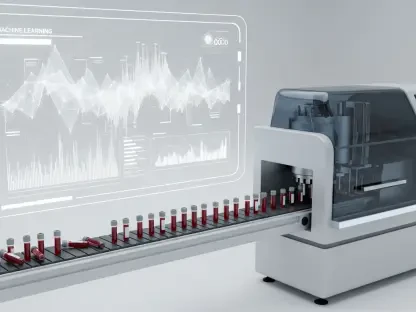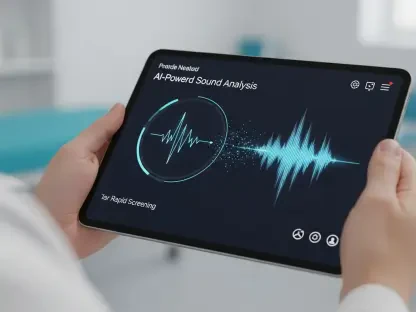In a major breakthrough in the field of drug development, revolutionary nanotechnology known as Facilitated Self-Assembling Technology (FAST) has been unveiled, promising to drastically transform drug solubility. Spearheaded by Stephen Hsu, PhD, a professor at the Dental College of Georgia, FAST was introduced during the 8th World Congress on Infectious Diseases in Rome, Italy. This innovative technology is designed to convert water-insoluble compounds into nanoparticles that maintain stability and provide efficacy for medical and consumer products. The conventional methods, which often rely on complex engineering processes and costly materials such as metals, polymers, and surfactants, are being challenged by FAST’s simple, efficient, and elegant approach. FAST utilizes EGCG-palmitate (EC16) from green tea as a key compound, leveraging its naturally occurring antioxidant, anticancer, anti-inflammatory, and antimicrobial properties. This new approach, by overcoming former limitations of instability, is set to revolutionize the use of such beneficial compounds in a wide array of applications.
A New Horizon in Drug Formulation
FAST brings a novel simplicity to drug formulation, as highlighted by Stephen Hsu’s demonstration of developing multiple drug formulations in a mere afternoon. This method not only accelerates the formulation process but also significantly expands potential uses across diverse industries, ranging from medical therapeutics to everyday consumer products. Particularly promising are its innovative applications in the development of nasal sprays and disinfectants that could play a crucial role in preventing viral infections and maintaining hygiene standards in places like hospitals. An EC16-based disinfectant has been formulated to be natural, non-toxic, and effective against a broad spectrum of pathogens, a development poised to make a significant impact in environments where strict infection control is necessary. For venues that are frequently associated with infection outbreaks, this represents a noteworthy advancement. The advent of such effortless and efficient drug formulation methodologies could change the current landscape of pharmaceutical innovation, offering safer alternatives and reducing the need for potentially harmful additives.
Addressing Respiratory and Gastrointestinal Challenges
Advancing further into respiratory and gastrointestinal innovations, FAST displays remarkable potential in addressing issues like long COVID and other persistent respiratory illnesses. A preclinical nasal spray, targeting virus entry points in the nasal passageways, is underway with the aim of assisting immunocompromised individuals and those suffering from enduring symptoms. The significance of these developments in modern medicine cannot be understated, as infection initiation often occurs in these mucosal sites. In vitro studies have shown encouraging results against human coronavirus variants, reinforcing FAST’s promise in respiratory defense. Additionally, oral formulations created through FAST are proving stable within the harsh acidic environments of the stomach. This stability is crucial for tackling gastrointestinal issues such as Crohn’s disease and other inflammatory bowel conditions. With the support of EC16 nanoparticles in limiting viral infection without requiring direct contact, new frontiers in digestive health management are achievable. The uniqueness of these nanoparticles in delivering therapeutic effects highlights the far-reaching impact of FAST.
Applications Beyond Medicine
As the potential of FAST stretches beyond traditional medicine, various industries stand to benefit from its innovative approach to nanotechnology. By converting a wide range of hydrophobic compounds into stable, water-compatible nanoparticles, FAST opens up myriad opportunities for applications previously restricted by solubility limitations. Overcoming these barriers has enormous implications for fields such as Alzheimer’s research, offering new avenues for creating more effective therapies. The same technology could advance cancer treatments by improving the bioavailability of therapeutic compounds, enhancing the delivery and efficacy of cancer drugs. Furthermore, development in oral health has also received focus, with possibilities for novel formulations that combat biofilm and prevent infections within hospital settings. The move towards these innovative applications introduces promising solutions that are both economically feasible and environmentally conscious, addressing pressing global health concerns. Beyond its existing scope, FAST paves a new path for future research and development in sectors seeking environmentally sustainable and efficient process enhancements.
Paving the Way for Future Developments
A significant advancement in drug development has emerged with the unveiling of Facilitated Self-Assembling Technology (FAST), a groundbreaking nanotechnology that promises to revolutionize drug solubility. Led by Stephen Hsu, PhD, a professor at the Dental College of Georgia, FAST was announced at the 8th World Congress on Infectious Diseases in Rome, Italy. This cutting-edge technology turns water-insoluble compounds into stable nanoparticles, increasing their effectiveness for medical and consumer applications. Traditional methods often depend on complex processes and expensive materials, such as metals and surfactants. In contrast, FAST offers a straightforward, efficient solution. It harnesses EGCG-palmitate (EC16) from green tea, known for its antioxidant, anticancer, anti-inflammatory, and antimicrobial properties. By overcoming past challenges of instability, this approach is poised to transform the utilization of these beneficial compounds across a wide range of applications, promising new possibilities in treatment and product development.









